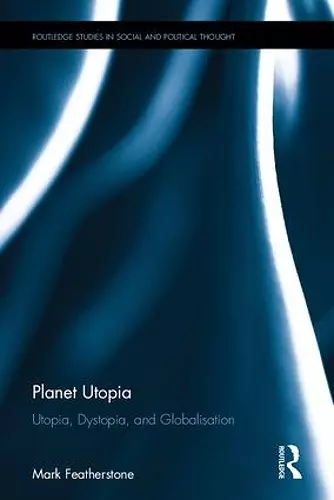Planet Utopia
Utopia, Dystopia, and Globalisation
Format:Hardback
Publisher:Taylor & Francis Ltd
Published:2nd Mar '17
Currently unavailable, and unfortunately no date known when it will be back
This hardback is available in another edition too:
- Paperback£41.99(9780367864255)

The key figure of the capitalist utopia is the individual who is ultimately free. The capitalist’s ideal society is designed to protect this freedom. However, within Planet Utopia: Utopia, Dystopia, Globalisation, Featherstone argues that capitalist utopian vision, which is most clearly expressed in theories of global finance, is no longer sustainable today.
This book concerns the status of utopian thinking in contemporary global society and the possibility of imagining alternative ways of living outside of capitalism. Using a range of sociological and philosophical theories to write the first intellectual history of the capitalist utopia in English, Featherstone provokes the reader into thinking about ways of moving beyond this model of organising social life through sociological modes of thought. Indeed, this enlightening volume seeks to show how utopian thinking about the way people should live has been progressively captured by capitalism with the result that it is difficult to imagine alternatives to capitalist society today.
Presenting sociology and sociological thinking as a utopian alternative to the capitalist utopia, Planet Utopia will appeal to postgraduate and postdoctoral students interested in subjects including Sociology, Social Theory, Cultural Studies, Cultural Theory and Continental Philosophy.
We live on planet utopia. The very ideas of utopia and dystopia, how we understand cultural politics, the means by which we historicize capitalism, comprehend global finance, the city, and the state, Mark Featherstone’s extraordinary Planet Utopia argues, have all become invested in, and developed through utopianism. Yet, in many ways, he suggests, multiple utopias have replaced utopia as the defining feature of our broken national identities, and together they have become a global specter that haunts contemporary sociology. Featherstone’s creation of what might be called "spectral social studies" is thus set to become a key area for examining the issue of utopia.
Professor John Armitage, Winchester School of Art, University of Southampton.
Planet Utopia is a truly lucid and prophetic analysis of contemporary society symbolized in all its spirit of negation and rage by the new revolt of the masses that is politics in the age of Brexit and Trump. For Featherstone, the sudden collapse of the savage utopianism of the frictionless economy of the neo-capitalist imaginary results in a future that is as undecided as it is consequential. Thinking philosophically, seeing cinematically and interpreting sociologically, this important book inquires whether the future will be caught up in a nativist trajectory of murderous violence and revenge-taking or something else entirely, namely a vision of human creativity and imagination that takes root in the very bleakest ruins of the present.
Arthur Kroker, author of Exits to the Posthuman Future
We live on planet utopia. The very ideas of utopia and dystopia, how we understand cultural politics, the means by which we historicize capitalism, comprehend global finance, the city, and the state, Mark Featherstone’s extraordinary Planet Utopia argues, have all become invested in, and developed through utopianism. Yet, in many ways, he suggests, multiple utopias have replaced utopia as the defining feature of our broken national identities, and together they have become a global specter that haunts contemporary sociology. Featherstone’s creation of what might be called "spectral social studies" is thus set to become a key area for examining the issue of utopia.
Professor John Armitage, Winchester School of Art, University of Southampton.
ISBN: 9780415997706
Dimensions: unknown
Weight: 453g
260 pages